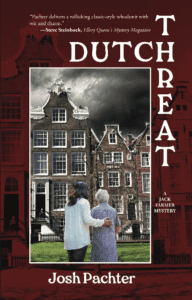 My first short story appeared in Ellery Queen’s Mystery Magazine in 1968. Since then, I’ve been fortunate enough to sell over a hundred more to EQMM, Alfred Hitchcock’s Mystery Magazine, and many other periodicals and anthologies, and the Short Mystery Fiction Society awarded me its Golden Derringer for Lifetime Achievement in 2020.
My first short story appeared in Ellery Queen’s Mystery Magazine in 1968. Since then, I’ve been fortunate enough to sell over a hundred more to EQMM, Alfred Hitchcock’s Mystery Magazine, and many other periodicals and anthologies, and the Short Mystery Fiction Society awarded me its Golden Derringer for Lifetime Achievement in 2020.
Despite this long history of writing and selling short crime stories, though, it wasn’t until this month—fifty-five years after my debut—that Dutch Threat, my first full-length work of fiction, was published by Genius Book Publishing.
Why did it take me so long to write a novel?
That question will be harder for me to answer than it was to ask, and my response breaks down into five sub-answers:
Time. I’ve been teaching at the college level for almost as long as I’ve been writing professionally, and my career in education—combined with writing and translating short stories, editing almost two dozen anthologies, and my responsibilities as a husband and father—has kept me kinda busy. When I retired from full-time teaching last fall, I suddenly found myself with more free time than I’d grown accustomed to having.
Attention Span. It takes me anywhere from a day or two to a month or two to write a short story, where I saw that it would take me well over a year to write a novel … and, frankly, I’ve never felt confident that I could stay focused on a single project for that long.
Readership. When I sell a short story to EQMM, I know that it will be read by thousands of people, but the typical novel (and by “typical” I mean “not written by James Patterson or Michael Connelly”) will attract a significantly smaller number of readers.
Variety. Writing a novel means spending a year or more delving into the lives of a single cast of characters, a single basic setting, a single plot. In that same year, I can write a dozen short stories, which gives me the opportunity to explore a dozen casts of characters, a dozen settings, a dozen plots.
Marketing knowledge. I have over time developed a pretty good sense of the marketplace for short crime fiction, and I know even before I begin to write a short story where I’ll have the best shot at selling it. I know nothing, however, about selling a novel—and it’s always seemed counterproductive to me to devote a year to writing a single work that I have no idea how to sell.

How, then, did Dutch Threat happen? Well, I came up with an idea for a work of fiction about several murders in a closed community in the heart of Amsterdam, a city in which I lived for about six years in the 1980s, and the concept just seemed too complicated for a short story. I started writing—and, before I knew it, I found myself writing a novel, after all.
Then, completely coincidentally, Stephen and Leya Booth at Genius reached out to me—based on a recommendation from terrific short-story author David Dean—and asked if I might by any chance have a novel that was looking for a publisher … and, I’ll be darned, I did!
As things turned out, the process of writing and then finding a home for Dutch Threat wasn’t nearly as daunting as I expected it to be, and the early reviews and sales figures have been very encouraging.
So who knows, perhaps I’ll start writing a novel every fifty-five years!
JOSH PACHTER was the 2020 recipient of the Short Mystery Fiction Society’s Golden Derringer for Lifetime Achievement. His stories appear in Ellery Queen’s Mystery Magazine, Alfred Hitchcock’s Mystery Magazine, and elsewhere. He edits anthologies (including Anthony Award finalists The Beat of Black Wings: Crime Fiction Inspired by the Songs of Joni Mitchell and Paranoia Blues: Crime Fiction Inspired by the Songs of Paul Simon) and translates fiction and nonfiction from multiple languages—mainly Dutch—into English.
DUTCH THREAT
All work and no play might well make Jack a dull boy. But when one of his professors offers to send American grad student Jack Farmer to Europe to do historical research in Amsterdam's Begijnhof—a peaceful closed community in the heart of the bustling Dutch capital—Jack looks forward to a summer of mostly play and not much work. Then he meets Jet Schilders, an attractive young nurse who takes care of the elderly woman next door, and realizes that his summer in The Netherlands might just turn out to be even more fun than he’d hoped.
When the woman next door is brutally murdered, though, and her nurse turns out to be the prime suspect, Jack and Jet join forces in an attempt to find the real killer and clear her name. But their investigation puts them in Dutch with the local police, and a second murder raises the stakes ... and paints a target on both of their backs.
PURCHASE LINKS
Direct from the publisher: https://geniusbookpublishing.com/collections/light-fiction/products/dutch-threat
Amazon: https://www.amazon.com/Dutch-Threat-Josh-Pachter/dp/B0CHDLCM2H
Barnes & Noble: https://www.barnesandnoble.com/w/books/1144044470?ean=9781958727140

Congratulations, Josh, on another major accomplishment. The question is, will there be a second novel?
There will be, Grace — and you won’t have to wait fifty-five years for it! I didn’t mention it in this blog post, but I have a book for younger readers coming from Level Best in February. It’s called First Week Free at the Roomy Toilet, and beta readers from ten to seventy have enjoyed it!
Grace. Thanks for stopping by. You asked the big question….when a novel is this good, will we have to wait forever for a second one.
Josh,
Thanks for being here today. Glad to hear about your young reader book, but I hope adults don’t have to wait fifty-five years, too.
Thanks, Debra. I still prefer short stories to novels, but we’ll see if this one does well enough to
motivate me to write a sequel!
Nice post, Josh. I enjoyed reading about your perspective on the difference between writing a short story for a magazine and writing a novel. Best of luck with Dutch Treat!
Thanks, Kathleen! I hope you’ll read and enjoy Dutch Threat, too!
Kathleen….thanks for stopping by and noting the different perspectives Josh brings to short stories and novels. So many people draw a line between the two, but Josh does a good job showing us where it separates and where it blends.
Knowing how you write, I’m sure you did a great job on the novel. Congrats on getting it published so easily and quickly! And good luck for any sales.
Sorry, voice recognition fail. I’m trying to say good luck for many sales.
That should be many, not any.
Thanks, Kaye. I’m always grateful for any sales … but certainly hopeful for many!
Kaye,
Don’t worry, your well wishes for Josh and MANY sales came through loud and clear….and we all echo your thoughts.
Congratulations, Josh. Your writer journey sounds a lot like mine, only backwards. I find writing novels easier than writing short stories! Your reasons really resonate with me, though. Best of luck.
Saralyn,
Being someone who writes both long and short, I never thought about the differences until people started telling exactly what you and Josh have said. Happily, both of you are successful in your chosen formats (and when you cross-over — even if for Josh, it became the fifty-five year plan._